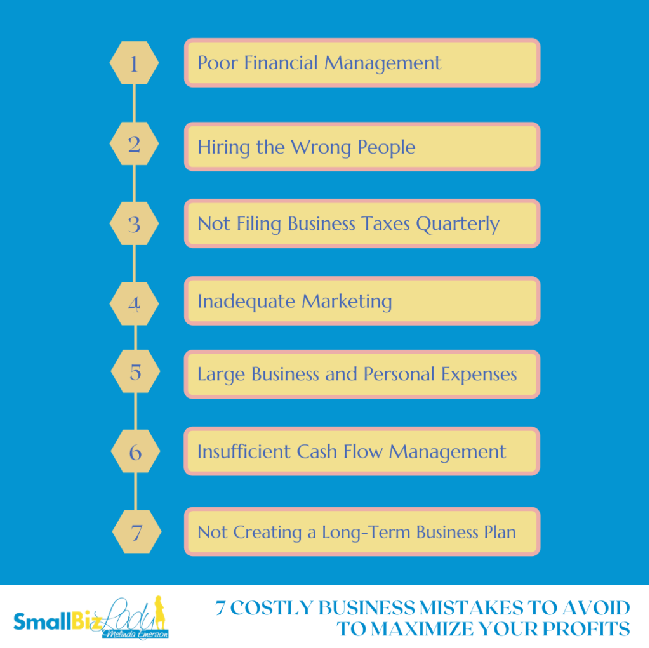7 Costly Business Mistakes to Avoid to Maximize Your Profits
Nobody said running a business was easy. As a business owner, you’re not only the CEO, but you’re also the head of HR, an administrative assistant, and a bookkeeper. Building a business from scratch is rewarding work, allowing you to make a career out of something that is your passion. However, it’s not without its risks.
Journeying down the path to a successful business is filled with hurdles and path changes but knowing ahead of time ways to avoid losing money is essential to keeping your business afloat. A few wrong moves could make or break your small business.
We’ll go over seven costly business mistakes and how to avoid them, ensuring you continue to bring in profits.
Avoid These 7 Costly Business Mistakes
Some mistakes can’t be completely avoided but knowing how to correct or prevent them is vital to creating a successful business.
1. Poor Financial Management
When you start your business, you need to have a grasp on both your personal and business finances. One way to do that is to have separate business and personal bank accounts, including savings, credit cards, and checking accounts. It makes it easier to plan your quarterly tax estimates, figure out your profits, and budget for upcoming months. Additionally, the IRS has strict rules about using business funds inappropriately, and you want to avoid any fees or penalties at all costs.
When you get your business started, you need to figure out how much credit you can use for emergencies and the amount of money you need to stay afloat. Working with a financial planner or accountant can help you create a long-term financial plan and budget. While that can be costly, especially at the start of business, it’s a worthy investment in yourself and your business.
2. Hiring the Wrong People
Sometimes when you’re trying to get your business off the ground, you need help, and you need it fast. That often leads people to hire underqualified people because they’re in a rush to fill a need, leading to costly hiring mistakes.
Develop a hiring strategy for each position you’re trying to fill. This includes writing job descriptions, compiling interview questions, where you’ll look for candidates, and how you’ll conduct interviews. Build out time to speak to multiple qualified candidates. It may take more time than you’d like to find the right person, but it’ll cost you more money in the long run to hire and retrain current employees.
3. Not Filing Business Taxes Quarterly
If you wait to file your taxes in April of each year, it can result in a huge hit to your cash flow and a major strain on your business. Work with an accountant to file business taxes quarterly so you can make estimated payments. As a business owner, you’re responsible for paying the IRS all of your tax obligations throughout the year. It’s no fun having to make large payments during the year but consider it another one of your business expenses. If you plan accordingly, it won’t be as big of a hit to your business’s cash flow.
4. Inadequate Marketing
Marketing is important to expanding your customer base and letting current customers know of upcoming products. There are a lot of ways to market, especially in the digital age we live in. This can include:
- Paid advertisements
- Optimizing your website and product pages
- Email marketing campaigns
- Social media marketing
- Video advertisements
A lot of first-time business owners wait to market once they’ve built up their cash flow. Marketing shouldn’t be put on the back burner, especially with a new business. If you wait to market a product until after you do not see the results you want, it can be too late to build up momentum. Build an effective marketing campaign into your business launch plan.
5. Making Large Business and Personal Expenses
You may want to purchase high-end laptops and a nice office space when your business gets started, but you’ll want to evaluate these decisions carefully. With each large purchase, you have to think about if they’ll help you create more revenue in the short term and if they’re an essential purchase. Fancy electronics and team-building lunches aren’t vital at the beginning of a business and don’t increase your bottom line. Get by with the bare minimum as you launch your business.
Additionally, avoid making any large personal purchases. Even if you have separate business and personal accounts, you may have to use some personal funds for your business. There are multiple scenarios and variables that occur during the first couple of years of starting a business, and it’s good to be prepared at all times. Just as you’re operating on the bare minimum with your business, do the same with your personal finances.
6. Insufficient Cash Flow Management
Managing how and when you receive payments from your clients is important to keeping money coming in. In your contracts, ensure that payment schedules are clear and agreed upon between yourself and your client. Track how quickly you receive payments from your customers once you send them an invoice. Accept digital payments in all forms, including credit card, wire payments, and Electronic Funds Transfer. You can also offer discounts to customers who pay early. Enforce your payment schedule, and don’t hesitate to follow up with your customers when they’ve failed to pay.
7. Not Creating a Long-Term Business Plan
Planning out the desired trajectory of your business may seem tedious, but without a clear plan that includes market potential, competitor research, and proof of concept, your business won’t succeed. This doesn’t just include an overall business plan. You’ll need to consider a marketing, financial, and product plan. Knowing where you’re headed and the steps you need to take to get there will help ensure your success. Set goals for your business, both short and long-term, to help you manage and measure your business’s performance.
Maximize Your Profits and Succeed in Your Business
Some mistakes can’t be avoided. You can plan for every possible scenario and still get hit by something out of left field. However, if you’ve prepared your business and avoided certain mistakes, your business won’t be knocked off course or lose profits when it encounters an unexpected hurdle. Think long term and build strategies for every possible scenario.
















